How heartland shops got a chance to work with big Swedish firms like H&M and Anticimex
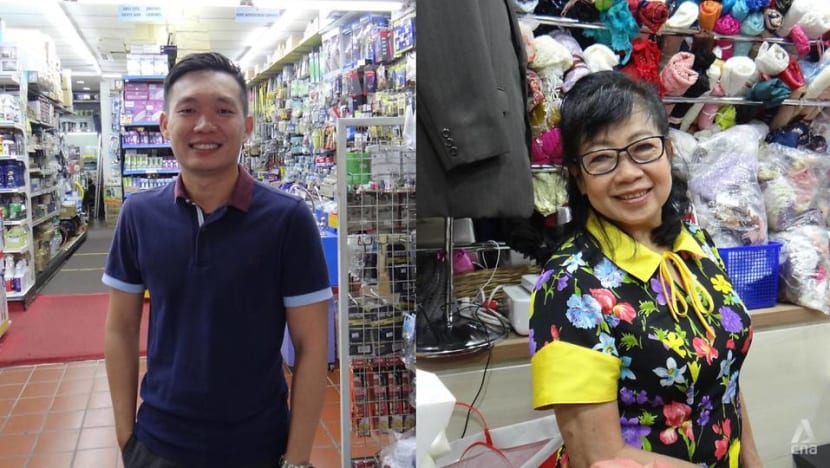
Hardware store owner Chia Wei Liat and tailor Nancy Kong are among the 12 small home-grown businesses that got a chance to work with Swedish multinational companies like H&M, as part of an initiative organised by the Swedish Chamber of Commerce Singapore. (Photo: Tang See Kit)
SINGAPORE: From electrical and pipe fittings to nails and bolts of various shapes and sizes, hardware store InHome Trading carries hundreds of home repair tools and products in its small shop located at a HDB block in Ang Mo Kio.
The long-time business has served many generations of residents in the neighbourhood although these days, it also takes on orders from other parts of Singapore through its online store on e-commerce platform Lazada.
The latter may not be much for now, said InHome’s second-generation owner Chia Wei Liat, but it is a way to cope with the uncertainties of running a retail business amid the prolonged COVID-19 pandemic.
The hardware store actually made the first step to go digital in 2019, recalled the 35-year-old who took over the family business about five years ago. However, given a lack of expertise and time, its page on Lazada looked “rundown” with limited products for the longest time.
READ: Heartland shops to tap on Instagram, Facebook for new lease of life
“Previously the homepage was just a list of products - no sorting or any categories. We were doing this on our own and going online was a very new thing for us,” said Mr Chia.
With some help, the online store went through a revamp in September last year. It now features products sorted by categories, brands and popularity.
It also worked on its Google Business page by adding in details such as operating hours, phone number and a link to its online store. Customers can now leave reviews as well.
The helping hand in going digital came from an unlikely partner – Swedish pest control firm Anticimex.
“Their marketing team helped redesign the layout of our online store. Now it looks much nicer and appealing to customers,” said Mr Chia.
“They also helped us to set up our Google Business page. We didn’t know how to but after they told us to submit some documents, we can finally add in details such as operating hours and change the previous address which wasn’t that accurate,” he added.
“This has definitely increased our brand awareness. We had people calling and said they found our number on Google.”
READ: Heartland shops welcome CDC vouchers, but experts say long-term solutions needed to revitalise business
“MAKE SOMETHING POSITIVE”
The unlikely collaboration of a heartland merchant and a multinational corporation (MNC) was the result of a Sweden-Singapore initiative organised by the Swedish Chamber of Commerce Singapore (SwedCham).
The initiative, according to SwedCham general manager Lisa Ferraton, aimed to foster collaboration between small and large companies during a difficult time.
The MNCs sponsored an advertising campaign, which ran on selected buses and bus stops in November last year, to promote their smaller partners. Each pair also had meetings dubbed “Fika4Good”, a reference to the Swedish tradition of fika or chats over coffee, to discuss issues they face and how to solve them.
Apart from InHome and Anticimex, 22 other Swedish MNCs and small home-grown businesses ranging from hawkers to tailors were paired up.
Ms Ferraton noted that the chamber was pleased with what the initiative has achieved so far.
“When we started this, we didn’t know where this project would go. We just wanted to try to make something positive in a challenging environment,” she said.
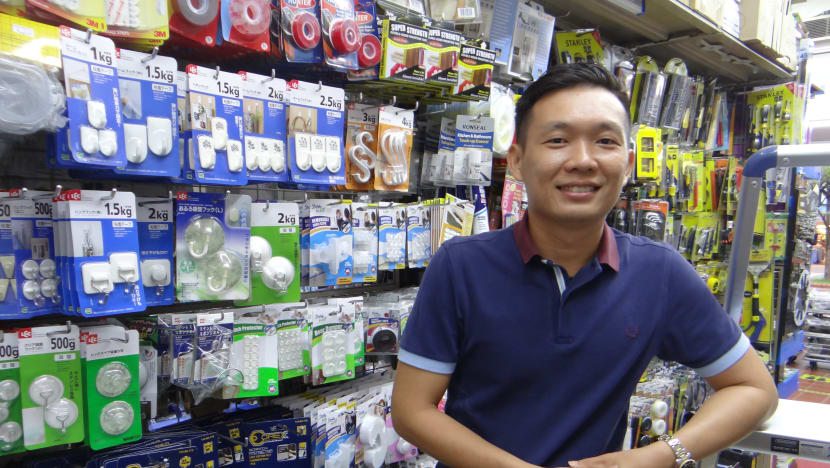
Mr Chia admitted that he too went into the initiative with little expectations, partly as his bigger partner came from an entirely different industry. Working with an MNC that employed hundreds of people also seemed unimaginable for a heartland merchant with fewer than 10 employees.
But after a couple of meetings, the unlikely partners found some common ground.
Mr Philip Tan, general manager for sales in Asia at Anticimex, recalled: “My CFO (chief financial officer) and I visited Chia at Ang Mo Kio for our first meeting and when he told us that he had to close previously because of COVID-19 but their online store is not quite (set up), we immediately knew this is where we can help them.
“I roped in our marketing team to find out more about Chia’s online business and we formed a plan. Chia liked it and we had more discussions. It took us about two months to complete everything.”
These days, Mr Chia checks for online orders twice a day on his smartphone. Delivery bags and a printer are also among the new additions to the shop’s cashier counter.
He is aware that having an online presence “is not a one-off effort”. The store on Lazada is updated monthly with new products and competitive pricing, as being online means competition with even more sellers in and out of Singapore.
“All these will require time and effort on our part but I think it’s good enough that Anticimex gave us an initial kick-off,” said Mr Chia.
WATCH: Heartlands Go Digital launched to spur adoption of e-payments, digital commerce solutions among heartland enterprises
H&M MEETS TRADITIONAL TAILOR
Partners under the initiative did not all come from differing industries. Fashion giant H&M, for instance, was paired up with local tailor Nancy Kong, which it said was a great fit.
“This is very much in line with our aim for a more circular and sustainable fashion, meaning that we want to keep everything in the loop as much as possible, maximise the use of resources and minimise waste,” said H&M Southeast Asia’s sustainability manager Marian Dang.
Tailors help to prolong the lifespan of old clothes by altering or repairing them, or even give them a new life through upcycling, she added.
“We also felt that traditional tailors were not getting as much exposure as they should, and we want to help. So in various ways, Nancy was perfect for us,” said Ms Dang, while noting that H&M promoted Ms Kong through advertisements and shout-outs on its social media platforms.
Ms Kong, who has been running Vega Tailoring and Dressmaking shop at Bukit Timah Plaza for the past three decades, said the pandemic has added to the difficulty of running a traditional business.
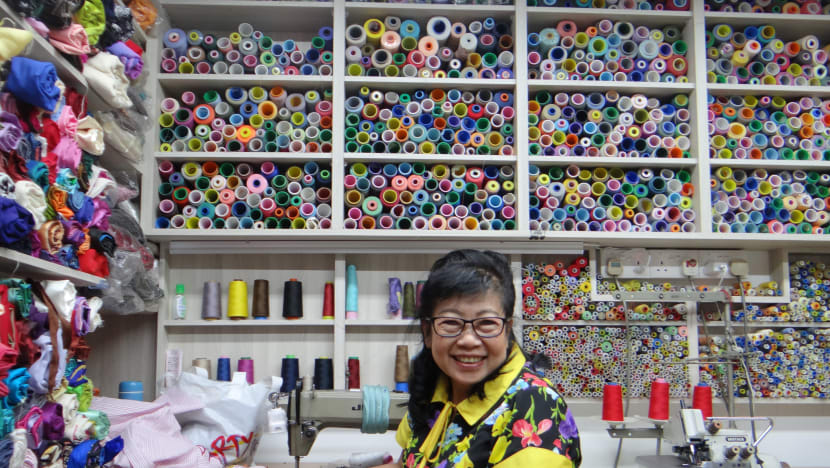
While she has built up a group of loyal customers, revenue has halved, largely because restrictions on wedding receptions and people continuing to work from home mean little need for tailor-made suits or dresses.
The additional exposure is certainly welcomed although she felt “a little paiseh ('shy' in Hokkien)” when her customers sent her photos of the bus ads, the soft-spoken woman told CNA with a chuckle.
Ms Kong, who is in her 60s, has also been sewing fabric masks since last year, partly in an attempt to keep operating during the “circuit breaker” that shut all non-essential services. Dozens of them bearing colourful prints and some with fancy sequins and beads, are still on display outside her shop.
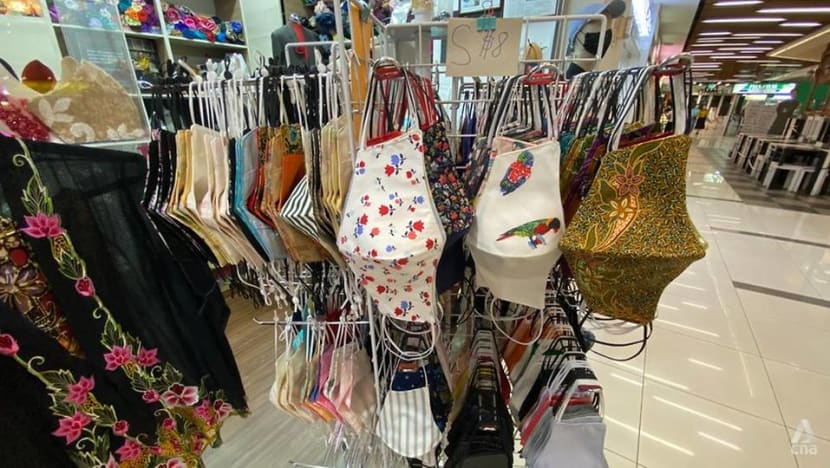
“Running a business means you just have to keep adapting. Change is the only way out,” she said in Mandarin.
But even with a keen adaptability, Ms Kong said her business faces another crucial problem that is manpower. Her trade requires an eye for details and also years to hone one’s skills. But many Singaporeans have shunned the industry while she is unable to hire foreigners due to quota restrictions.
Noting that she knows of many peers who have retired, she said: “It is really difficult to hire anyone, but I will carry on this for as long as I can.”
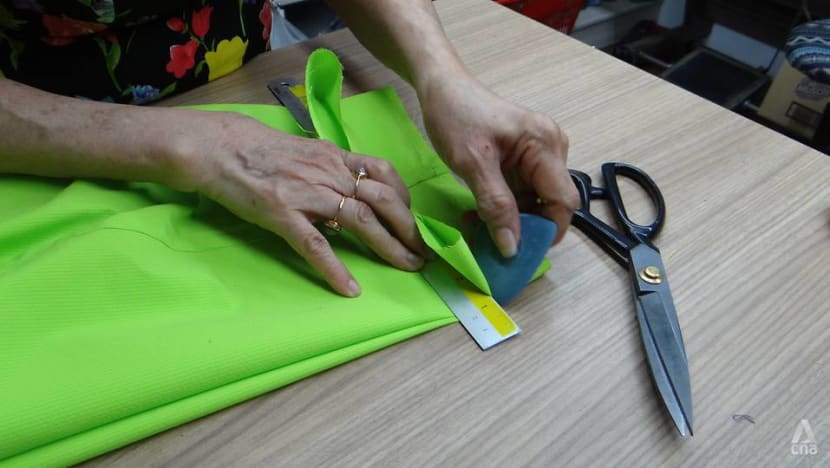
This was a new observation for Ms Dang.
“We started with wanting to create more exposure for Nancy, but talking to her made us realise that there is also a manpower issue so simply increasing demand is going to make it very difficult for her.”
With that in mind, H&M said it is exploring other ways to collaborate more meaningfully with Ms Kong.
Ms Ferraton noted: "One thing I've seen is how this is promoting understanding and adding value to both the MNCs and SMEs. That's why I want to emphasise that we didn’t go into this initiative to teach the SMEs. We wanted to start a dialogue."
Trade and Industry Minister Gan Kim Yong said that the initiative was a “clear example” of how Swedish and Singapore companies have come together to help one another amid the pandemic.
“The campaign translated to increased exposure, footfall and sales for our local partners. I want to encourage such collaborations under the initiative to continue,” he said at a business event last month.
SwedCham said it is considering pairing up MNCs with larger SMEs as part of the next phase of the initiative but this remains a work in progress.
What is confirmed is that the “Fika4Good” meetings will continue, alongside another programme that sees Swedish firms hosting company attachments as part of the Workforce Singapore’s SGUnited Mid-Career Pathways Programme.
“This is an important area for us at SwedCham so the local outreach will definitely continue,” said Ms Ferraton.
BOOKMARK THIS: Our comprehensive coverage of the COVID-19 pandemic and its developments
Download our app or subscribe to our Telegram channel for the latest updates on the coronavirus outbreak: https://cna.asia/telegram















